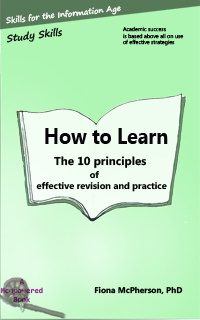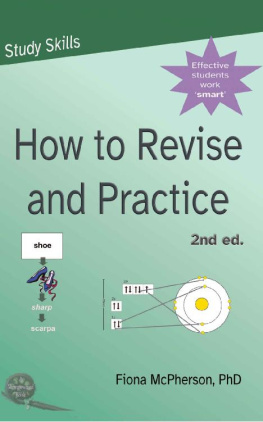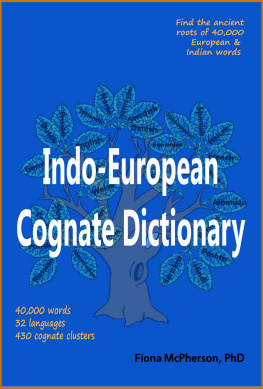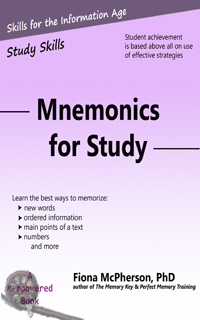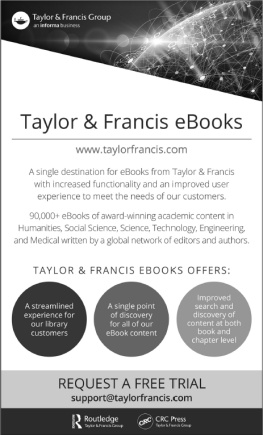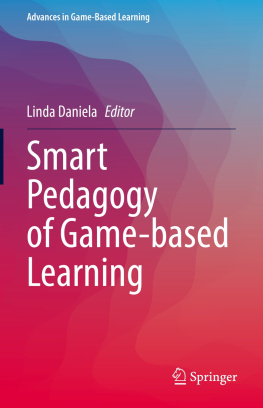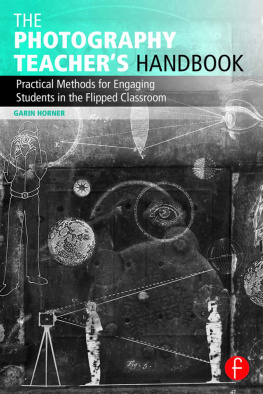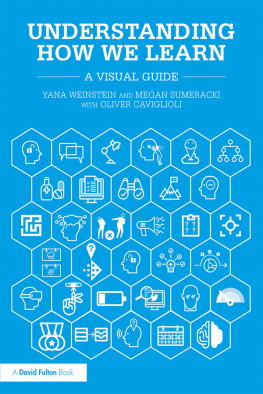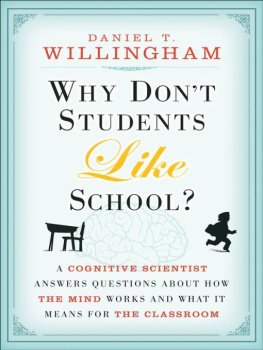How to Approach Learning
What teachers and students should know about succeeding in school
By Dr Fiona McPherson
www.mempowered.com
Published 2015 by Wayz Press, Wellington, New Zealand.
Copyright 2015 by Fiona McPherson.
All rights reserved.
No part of this publication may be reproduced, stored in a retrieval system, or transmitted in any form or by any means, electronic, mechanical, recording or otherwise, without the prior written permission of Wayz Press, a subsidiary of Capital Research Limited.
ISBN 978-1-927166-29-1
About the author
Fiona McPherson has a PhD in cognitive psychology from the University of Otago (New Zealand). Her first book, The Memory Key , published in 1999, was written in response to what she saw as a lack of practical advice on how to improve memory and learning skills that was based on the latest cognitive research. Since that time, she has continued to provide such advice, through an extensive website (www.memory-key.com), and several books focused on specific memory and learning skills.
How to Approach your Teaching or Learning
This book collects most of the articles and some of the research reports on study skills from my websites Mempowered (www.mempowered.com) and About Memory (www.memory-key.com). It doesn't aim to provide a complete or step-by-step account, but instead tries simply to introduce you to a number of concepts and strategies that may help you change your approach to teaching or studying.
The articles and reports have been arranged and edited for greater cohesiveness.
For greater detail on specific study strategies, such as note-taking, mnemonics, and revision, I point you to my proper books (that is, those books designed and written as complete works).
Effective Notetaking
The most popular of Dr McPherson's study skills books; now in its 2nd edition. This workbook shows you how to format your notes, use headings and highlighting, write different types of text summaries and graphic ones, make the right connections, evaluate the text, and choose the strategies that are right for both you and the situation. Find out more about this book
Mnemonics for Study
While mnemonics don't help you understand your material, they do help you remember those many details you need to achieve expertise in a topic details such as the names of things, technical words, lists of principles. Find out more about this book
How to Learn: The 10 principles of effective revision & practice
Strategies for improving understanding and memory can only take you so far, if you dont know how to cement that information into your brain for the long term. This book tells you how to review your learning in the most optimal way, using examples from science, math, history, foreign languages, and skill learning. Find out more about this book
Successful Learning Simplified
This book is designed to present a wide range of effective learning strategies as simply as possible, omitting the detail given in Effective Notetaking , Mnemonics for Study , and How to Learn , and adding some additional material on active reading strategies. This book can be used either as a quick reference, or as a simplified guide to the most effective learning strategies, for those who want relatively simple examples and short explanations. Find out more about this book
What You Need for Successful Learning
Intelligence isnt as important as you think
While differences in IQ explain some of the differences in academic success, personality factors such as conscientiousness, curiosity, and humility, account for a similar degree of academic differences.
Our society gives a lot of weight to intelligence. Academics may have been arguing for a hundred years over what, exactly, intelligence is, but everyone knows what it means to be smart, and who is smart and who is not right?
Of course, its not that simple, and the ins and outs of academic research have much to teach us about the nature of intelligence and its importance, even if they still havent got it all totally sorted yet. Today I want to talk about one particular aspect: how important intelligence is in academic success.
First of all, to simplify the discussion, lets start by pretending that intelligence equals g and is measured by IQ testing.
What's g? It stands for general factor, and reflects the shared element between multiple cognitive tests. It's a product of a statistical technique known as factor analysis, which measures the inter-correlation between scores on various cognitive tasks. It's no surprise to any of us that cognitive tasks should be correlated that people who do well on one cognitive task are likely to do well on others, while people who do poorly on one are likely to perform poorly on others. No surprise, either, that some cognitive tasks will be more highly correlated than others. But heres the thing: the g factor, while it explains a lot of the individual differences in performance on an IQ test, accounts for performance on some of the component sub-tests better than others. In other words, g is more important for some cognitive tasks than others. Again, not terribly unexpected. Some tasks are going to require more intelligence than others. One way of describing these tasks is to say that they are cognitively more complex. In the context of the IQ test, the sub-tests each have a different g-loading.
There is no doubting that IQ is a good predictor of academic performance, but what does that mean exactly? How good is good? Well, according to Flynn (IQ test guru and author of the Flynn Effect), IQ tests that are heavily-loaded on g reliably predict about 25% of the variance in academic achievement. Note that this is about variance , that is the differences between people; this is not the same as saying that IQ accounts for a quarter of academic performance. What it's saying is that around a quarter of the difference in grades between student A and student B is explainable by their different IQ scores. But this does vary significantly depending on age and population for example, in a group of graduate students, the relative importance of other factors will be greater than it is in a cross-section of ten-year-olds. In the study I will discuss later, the figure cited is closer to 17%.
Regardless of whether its as much as 25% or as little as 17%, I imagine that these figures are much smaller than most people would have thought, given the weight that we give to intelligence.
So what are the other factors behind doing well at school (and, later, at work)?
The most obvious one is effort. One way to measure how hard people work is through the personality dimension of Conscientiousness.
One study involving 247 British university students compared the predictive power of the Big Five personality traits (Neuroticism, Extraversion, Openness to Experience, Agreeableness, Conscientiousness) on later exam performance, and found that Conscientiousness had a significant effect, and was the only trait to have a significantly positive effect. The most important aspects of Conscientiousness were Dutifulness and Achievement striving. Together with a component of Extraversion called Activity (which had a negative effect), these three attributes accounted for 28% of the variance in overall exam grades (over the three years of their undergraduate degrees). Note that this is more than IQ accounted for.
However, it is important to note that these students were a highly selected bunch undergraduates were (at this point in time) accepted to the University College London at an application: acceptance ratio of 12:1 so IQ is going to be less important as a source of individual difference (because they're pretty much all going to be bright).

